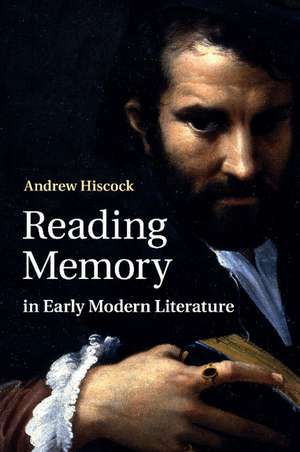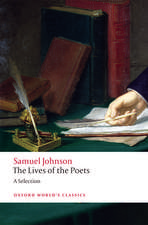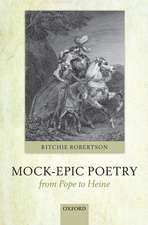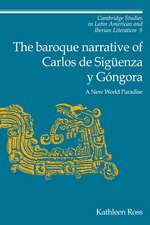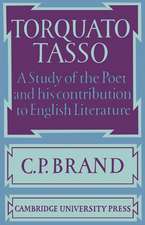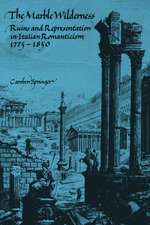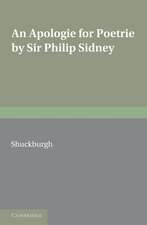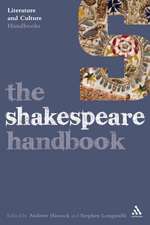Reading Memory in Early Modern Literature
Autor Andrew Hiscocken Limba Engleză Paperback – 5 noi 2014
| Toate formatele și edițiile | Preț | Express |
|---|---|---|
| Paperback (1) | 287.66 lei 6-8 săpt. | |
| Cambridge University Press – 5 noi 2014 | 287.66 lei 6-8 săpt. | |
| Hardback (1) | 699.36 lei 6-8 săpt. | |
| Cambridge University Press – 12 oct 2011 | 699.36 lei 6-8 săpt. |
Preț: 287.66 lei
Nou
Puncte Express: 431
Preț estimativ în valută:
55.04€ • 57.47$ • 45.56£
55.04€ • 57.47$ • 45.56£
Carte tipărită la comandă
Livrare economică 05-19 aprilie
Preluare comenzi: 021 569.72.76
Specificații
ISBN-13: 9781107463400
ISBN-10: 1107463408
Pagini: 334
Ilustrații: 5 b/w illus.
Dimensiuni: 152 x 230 x 17 mm
Greutate: 0.45 kg
Editura: Cambridge University Press
Colecția Cambridge University Press
Locul publicării:New York, United States
ISBN-10: 1107463408
Pagini: 334
Ilustrații: 5 b/w illus.
Dimensiuni: 152 x 230 x 17 mm
Greutate: 0.45 kg
Editura: Cambridge University Press
Colecția Cambridge University Press
Locul publicării:New York, United States
Cuprins
Introduction: 'the dark backward and abyss of time'; 1. 'To seke the place where I my self hadd lost': acts of memory in the poetry of Henry Howard, the Earl of Surrey; 2. 'Remembre not (lorde) myne offences': Katherine Parr and the politics of recollection; 3. 'Better a few things well pondered, than to trouble the memory with too much': troubling memory and martyr in Foxe's Acts and Monuments; 4. Text, recollection and Elizabethan fiction: Gascoigne, Nashe, Deloney; 5. The doleful Clorinda? Mary Sidney, Countess of Pembroke, and the vocation of memory; 6. 'Tell me, where all past yeares are': John Donne and the obligations of memory; 7. 'Of all the powers of the mind [...] the most delicate and fraile': the poetry of Ben Jonson and the renewal of memory; 8. 'This art of memory': Francis Bacon, memory and the discourses of power.
Recenzii
'Hiscock offers a fascinating account of the nature and uses of individual and cultural memory in the early modern period … he elegantly demonstrates … that remembering, committing to memory and memorialising were notions - and actions - at the very heart of identity formation through the course of the long sixteenth century.' Greg Walker, University of Edinburgh
'What a splendid book! … a study of memory in early modern English literature which will be of real value to students interested in either or both topics … these individual studies also present a compelling narrative of the ways in which older traditions of memory - and also poetry - gradually give way to newer ideas and idioms, so that the book as a whole provides … clearly focussed literary-critical snapshots of an age in transition.' Mike Pincombe, Newcastle University
'Although the sweep of this book is vast, the author's findings are sensibly grounded and often quite specific. This through-thread, consistent with the masterful arrangement of the book as a whole, makes it a delight to read.' Renaissance Quarterly
'Reading Memory [in Early Modern Literature] is exhaustively researched and filled with remarkable insights.' The Review of English Studies
'What a splendid book! … a study of memory in early modern English literature which will be of real value to students interested in either or both topics … these individual studies also present a compelling narrative of the ways in which older traditions of memory - and also poetry - gradually give way to newer ideas and idioms, so that the book as a whole provides … clearly focussed literary-critical snapshots of an age in transition.' Mike Pincombe, Newcastle University
'Although the sweep of this book is vast, the author's findings are sensibly grounded and often quite specific. This through-thread, consistent with the masterful arrangement of the book as a whole, makes it a delight to read.' Renaissance Quarterly
'Reading Memory [in Early Modern Literature] is exhaustively researched and filled with remarkable insights.' The Review of English Studies
Notă biografică
Descriere
Focusing on the lively debate of memory, this book maps how radical cultural and political changes shaped early modern England.
